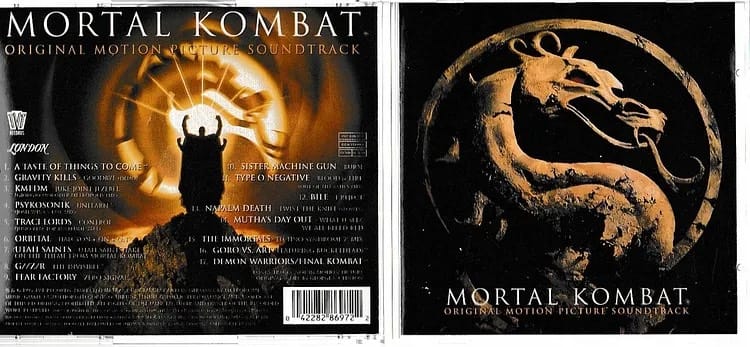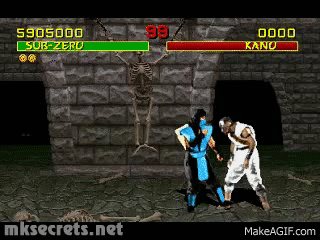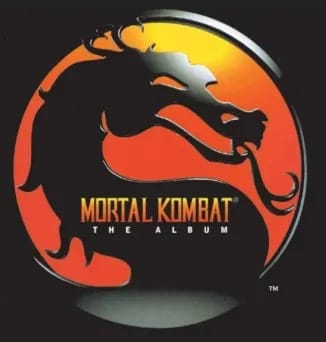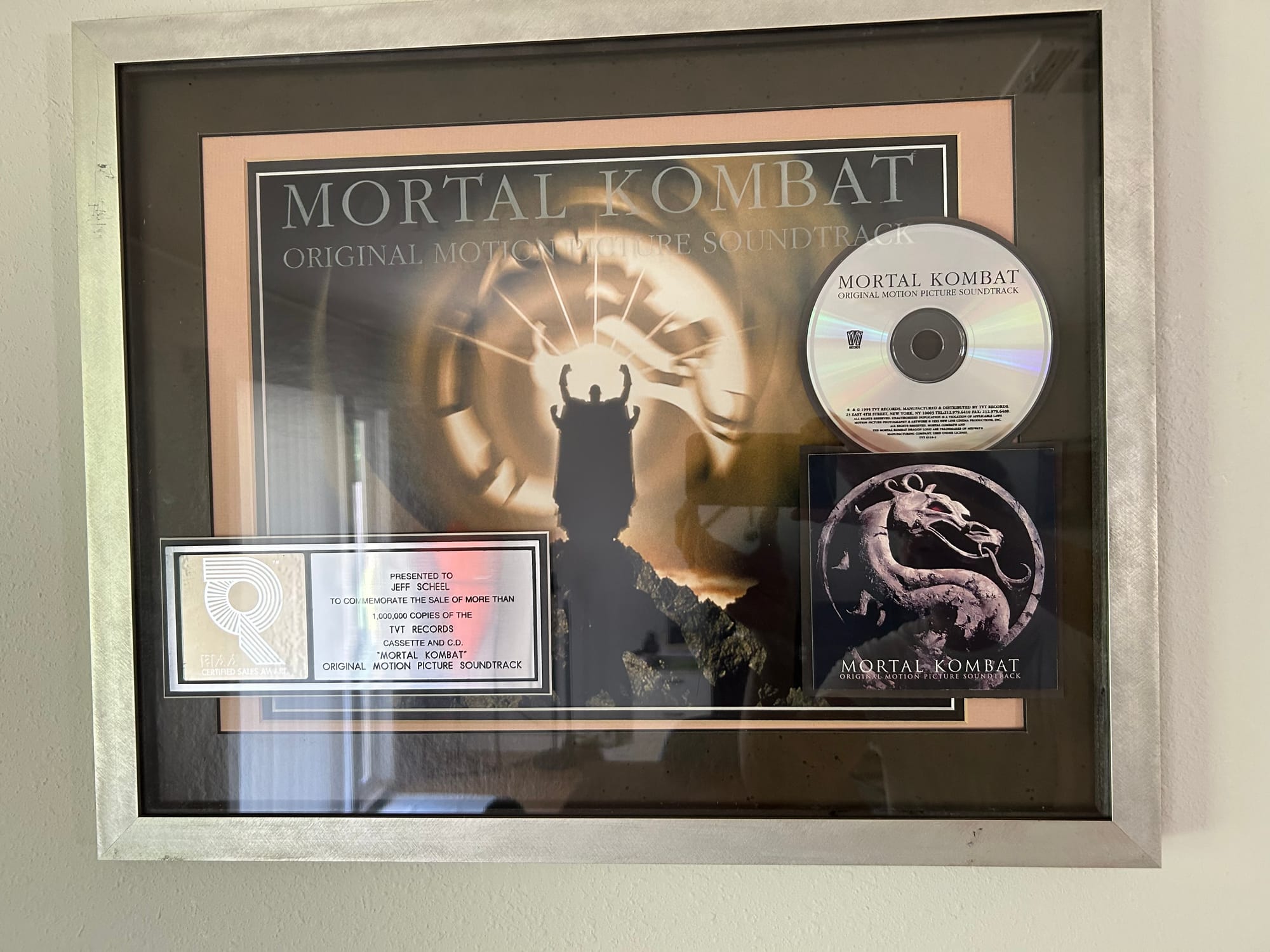Editor's Note: the following was written by Dylan Taylor-Lehman. Who is Dylan Taylor-Lehman? That's what I asked when the kind gentleman emailed me pitching this essay. However, immediately upon reading the title of the essay, the words MORTAL KOMBAT played in my head, as I too grew up on the iconic scream/intro/absolute banger of the game/movie's iconic soundtrack. I quickly skimmed through the draft and saw the kind of burning passion for the intersection between music and culture brimming between its lines and decided to pounce on the opportunity to run it. Reminder that you can just pitch us at eden[at]heavyblogisheavy.com[dot]com and I'll at least read what you have to say. And if it's good, we'll run it.
OK. Mortal Kombat time. Enjoy!

Part I - Reflections on the flawless victory that is this sonic masterpiece
A few things come to mind when thinking about music that could send a 90's kid into overdrive: “Jump Around,” anything on Jock Jams, and the peppy blast of third-wave ska—once described as the audio equivalent of whatever’s going through a kid’s head right before he demolishes a plate of pizza rolls at a sleepover.
All solid choices, to be sure. But when it comes to conjuring pure, action-packed adrenaline, there’s one track that towers above the rest like a looming Shokan warrior. And it can be distilled to just two words:
MORTAL KOMBAT!
That song, of course, is “Techno Syndrome (Mortal Kombat),” a track made immortal through its use in the 1995 Mortal Kombat movie. The song’s legendary scream and bouncy keyboards perfectly channel a video game come to life and helped catapult Mortal Kombat: Original Motion Picture Soundtrack to double-platinum glory.

It was a surprising triumph for an almost 70-minute soundtrack without a hit song that was moreover rounded out by an eclectic mix of EDM, industrial, alternative, and metal. But that very mixture is key to the soundtrack’s enduring appeal and truly life-changing impact. Being attached to such a huge property opened up wild new opportunities for the bands involved, but perhaps even more enduring is the inspiration the soundtrack had on a generation of nascent metalheads and ravers who got their first taste of the music that would become the soundtrack to their lives through the 17 tracks of Mortal Kombat: Original Motion Picture Soundtrack.
And so, on the thirtieth(!) anniversary of this sonic masterpiece, we’ll dive into how this tournament of sound came together, how it was able to hook pop culture like Scorpion’s harpoon, and why it still holds its own as a legitimately great album three decades later, influencing mosh pits and dance floors alike, and effortlessly decapitating its soundtrack peers.
Test your might
The original Mortal Kombat game was a monumental and controversial hit when it debuted in arcades in 1992. The game took the one vs. one fighting formula of the hugely popular Street Fighter II and made it darker and much more gruesome. While the violence of the original Mortal Kombat now seems laughably quaint, the fact that the characters weren’t drawings but motion-captured renderings of actual people gave the violence a sense of realism that at the time was truly shocking.

Politicians rushed to ban the game and Nintendo refused to include the blood when the game was ported to the SNES, but this of course only made the game more popular: the blood code for the Sega Genesis version was a key piece of playground lore. (ABACABB, obviously, and the lesser-known Game Gear’s blood code is 2 1 2 down up).
Mortal Kombat II hit arcades in 1993, an excellent sequel that intensified everything that was great about the first game, and a multimedia empire exploded from there: comics, action figures, cartoons, a TV series, and a traveling live-action stage show. A live action feature film was scheduled for release on August 18, 1995, and like many kids, I made sure to schedule a slumber party months in advance so we could stay up all night going over what we’d just seen.
It has begun!
Despite the excitement about a Mortal Kombat movie, fans weren’t without their concerns. Mortal Kombat would be following two legendarily bad major video game adaptations, Super Mario Bros. and Street Fighter, both of which were made by people who’d apparently never even seen the games. (Not to mention less popular adaptations like Double Dragon that were received just as poorly, if not worse.) Box office returns reflected fans’ disappointment, and fans were worried that Mortal Kombat might similarly botch the hit.
Fortunately, advance photos of the costumes and sets suggested that producers were making a sincere effort to capture the feel of the game. (I repeatedly rented Dumb and Dumber because I knew it had a preview for Mortal Kombat, and I could scarcely catch my breath when I saw a real life Scorpion.) But still, the game’s biggest demographic was the under-18 crowd, which meant the movie had to be a PG-13 – how would they convey the intensity the game was known for?
In the absence of blood spurting from uppercutted-off heads, producers had to find other ways to deliver the expected punch. One way to do this was to make the music as pulse-pounding as possible. “You have to have a beat that makes the audience move to the fight. Not just watch it from afar,” as Mortal Kombat producer Lawrence Kasanoff said, and the production team began curating a tracklist that would deliver the appropriate kick.
Fortunately, there was already a killer song that would serve as the movie’s main theme.

Part II - A taste of things to come
Let’s step back real quick to September 13, 1993, known as “Mortal Monday,” or the day the first Mortal Kombat game was released on home consoles. (This included a handheld Tiger Electronics version that looked like the game being played on a calculator, and I don’t mean a T89). Mortal Monday was hyped with an action-packed commercial that featured teens running wild on the streets of New York City, and at about 54 seconds in, there is a very famous yell — MORTAL KOMBAT!
As this awesome interview describes, that yell was made by a struggling actor who was simply putting in a day’s work and would go on to be sampled in “Techno Syndrome,” a song produced by The Immortals, a side project of the two guys behind Belgian electronic act Lords of Acid.

According to this excellent history of the song, the pair were asked by the game’s publisher to write a short album to accompany the game’s Mortal Monday release. The result was Mortal Kombat: The Album , which featured a track for each of the original seven characters, a track for Goro, and two additional tracks, one of which was “Techno Syndrome.” (The other tracks on the album are hilarious. Sub Zero’s theme features the chorus “Chinese ninja warrior / with your heart so cold / Sub Zero!” sung in a heavy European accent.)
“There’s just something special about having an anthem, a musical souvenir about a game that, to kids like me, was more than a game,” as one writer put it. The song would go on to become the franchise’s semi-official theme song before the movie hit theaters, supercharging fan anticipation.
Choose your fighter
To flesh out the rest of the soundtrack, the movie’s music supervisors put together a collection of tracks that strategically reflected the types of music a lot of gamers listened to, from alternative rock to industrial to techno to metal. Producer Lawrence Kasanoff recalled label executives laughing in his face at the idea of releasing an album of such niche music, but the production team eventually signed a deal with indie powerhouse TVT Records to release the record.
The choice made a certain amount of sense. TVT Records got its start in the 1980s releasing CD collections of classic TV theme songs — TVT stands for Tee-Vee Tunes — but would grow to significant indie prominence with the release of Nine Inch Nails’ Pretty Hate Machine in 1993. (Future artists on the roster included Lil Jon and Pitbull.)
As it happened, TVT had recently purchased Wax Trax! Records, a respected Chicago record store and indie label, which had a diverse roster of bands for the movie’s music supervisors to choose from. This led to phone calls that took many bands by surprise.
Jeff Scheel, vocalist of St. Louis-based industrial-alternative band Gravity Kills, whose song “Guilty” is the second track on the soundtrack, got a call at work from TVT label head Steve Gottlieb himself.
It was a pretty surprising call because the band hadn’t recorded an album or even played a show at that point, Scheel recently told me. The band had recorded a demo for a radio station CD compilation in their hometown of St. Louis, and the popularity of their song “Guilty” had apparently caught Gottlieb’s attention. Still, Scheel was still hesitant to be on the Mortal Kombat soundtrack because he wasn’t a gamer and was worried the movie was going to be some kind of goofy kids affair. He quickly realized what a mistake it would be to pass it up – and $10,000 to appear and an offer to sign with the label helped didn’t hurt either.
Chuck Schaaf, guitarist of Batesville, Arkansas alternative metal band Mutha’s Day Out, said the band, who were mostly teenagers at the time, already had an album out and were on tour when they got the call to not only be on the soundtrack but also appear in the movie itself as the band playing in the club where Sonya and Jax are trying to find Kano.
“We had seen just Billy Madison so we saw Veronica Vaughn [Bridget Wilson] walk by with her gun raised and that was pretty cool,” Schaaf said with a laugh. Plus they got their own trailer, saw a stuntperson get launched through a plate glass window, and were waved to by Trevor Goddard in full Kano makeup. “[Being on the soundtrack] was the only good decision our manager made for us,” he laughed.
For the more orchestral side of the soundtrack, composer George S. Clinton (not the funk legend, which I thought was the case for a long time) utilized obscure percussion instruments, throat singers, and low brass to infuse the score with a sense of otherworldly menace. Guitar virtuoso Buckethead’s soloing and riffing added another layer of epic intensity to the score.
The end result was a 17-track collection and felt as chaotic, colorful, and dangerous as the game itself. Anchoring it all was “Techno Syndrome,” which sent the theater into a frenzy when it started playing immediately at the beginning of the movie over a scene of flames exploding behind the MK dragon logo - and then again multiple times throughout the film.
It’s not about death, but life!
Gamers worried that the movie would be another Street Fighter were able to bleed a sigh of relief: Mortal Kombat was pretty faithful to the game and passed a schoolkid’s critical muster, with great-looking costumes, extravagant sets, a ton of one-liners, and some nice fan service, like Shang Tsung saying "Flawless victory!”, Johnny Cage doing a Friendship, and an announcer randomly announcing “Reptile!” at the start of the movie’s sickest fight.
The movie made over $122 million at the box office, a smash hit that exceeded expectations, but perhaps even more surprising was the success of the soundtrack, which sold more than two million copies. Mortal Kombat was a cultural phenomenon, to be sure, with diehards eager to buy up anything bearing the sign of the dragon, but the soundtrack’s success was also a testament to the power of a forgotten artform: the soundtrack album itself.
Soundtracks were once a vital part of the movie experience—hyping the movie, keeping it alive in the weeks after release, and planting its vibe in your head for good. Not only did soundtracks give listeners the opportunity to check out new music in the days before streaming (when a single CD was at least $17 fucking dollars, or more than $30 in today’s money!), but they also enabled fans to connect more deeply with the worlds and characters portrayed in the movies. Nothing gets you pumped or emotional like a good song, and in the case of a good soundtrack, there’s the added bonus of associating those feelings with the excitement and emotions of the movie they’re from.
Soundtracks also enabled further identification with the people and subcultures in the movies, especially if those subcultures seemed especially cool, like punks, slackers, and the ’90s coffeeshop crowd - think the soundtracks to Empire Records or Grosse Point Blank. Sometimes soundtracks just needed to rock , and that was OK too – soundtracks were known to deliver some true anthems. (Not that this is an anthem, but the remix of Green Day’s “Brain Stew” with kaiju sounds playing over it on the Godzilla soundtrack is hilarious.)
The Mortal Kombat soundtrack fit in with soundtracks of 90s neo-noir flicks like Hackers, Blade, The Matrix, Strange Days, Johnny Mnemonic, and Spawn, which featured heavier songs, edgier artists, and grimier vibes. (Not to mention the metal/hip-hop mashups on the Judgement Night soundtrack, which is a fucking banger in its own right!!)
And while these soundtracks were decently successful, none came close to the sales of Mortal Kombat: Original Motion Picture Soundtrack. There was a built-in audience eager to check out anything related to Mortal Kombat, and for those who weren’t already familiar with the music on the soundtrack, it did an excellent job of pulling us into the world, extending our adventure with the characters, and giving us a much more immersive experience. This was all the more powerful because we weren’t expecting to have such a transformative experience - we would’ve been content playing the fight song on repeat. It was one our first steps into a larger world, and the bands on the soundtrack could feel that whole new audiences had opened up to them.

Part III - Victory on Earthrealm
The Mortal Kombat soundtrack dropped at the perfect time for bands playing industrial-tinged alternative rock, says Jeff Scheel of Gravity Kills, helping make bands like themselves, Filter, and Stabbing Westward commercially viable. Gravity Kills themselves would go on to sign with TVT Records, release a number of well-received albums, and tour with elaborate stage shows. Crowds never stopped wanting to hear “Goodbye,” Scheel said, and it was astonishing to hear audiences around the world singing along to a song they wrote, let alone to think that it all started with a video game soundtrack.
“The Mortal Kombat soundtrack helped create a brand for Gravity Kills – it was a marketing arm in the days before social media,” Scheel said. “When we were being courted by labels, they told us ‘you’ll never be on TV because you’re not Trent Reznor,’ ‘you’ll never be on the radio’…It was the soundtrack that made that sound commercially viable.”

Gravity Kills would go on to be featured on the soundtracks to Escape from L.A. and Se7en, and even though they were paid significantly more for the appearance, neither of those soundtracks had the lasting impact of Mortal Kombat, for the band, their fans, and listeners in general. The band still gets residuals from the album from time to time – “pizza party money,” as the band calls it, since it’s mostly enough to buy pizzas and beer – a pleasant reminder of how this strange opportunity became one of their biggest breaks.
“[The soundtrack] created a perception of the band that we were something,” Scheel laughed. “People thought, ‘Oh we should be paying attention to this band because they’re getting movie deals and all kinds of crazy things. But we hadn’t even played our first show yet! It was a crazy opportunity that fell in our lap and I’ve got to give credit to the band’s ability to move fast [and take advantage of it].”
As for Mutha’s Day Out, being in the movie and on the soundtrack was easily one of the coolest things the band got to do, guitarist Chuck Schaaf said. The band was already coming to an end by the time the movie came out and so weren’t directly impacted by its success. Schaaf would go on to form heavier, purely metal bands like the painful doom act Rwake, and said they wouldn't even talk to people about being on the soundtrack for years because he felt Mutha’s Day Out wasn’t heavy enough and he didn’t want to seem like a poser. “But,” he said, “we finally reached an age where we were like, ‘you know what, that was pretty cool,’ especially for a band from Batesville, Arkansas!”
The Mortal Kombat soundtrack won a BMI Film & TV award for Film Music, as well as receiving a nomination for a Motion Picture Sound Editors Golden Reel award, which was somewhat unusual for a soundtrack album. As an article on Grammy.com notes, “These weren’t token nods. The BMI honor recognized the soundtrack’s performance in broadcast media, and the Golden Reel nomination put it alongside acclaimed Hollywood productions in sound editing.”
While it’s great the soundtrack was a success respected by the industry, much more important was how it warped the tender young minds of future metalheads. It's certainly not hard to see the overlap between ripping people in half at the waist or impaling then on blades coming out of a Tarkatan’s arms and later on headbanging to “Defleshed by Flies” and “Crispy Burnt-Up Human Legs.”
Like many kids, I saved my allowance to buy a copy so I could hear the iconic fight song. Fortunately, “Techno Syndrome” was being buried deep on side two, which gave me and other listeners plenty of time to absorb the album’s rich tapestry of sound.
For me, it was the unbelievable heaviness of Napalm Death’s “Twist the Knife (Slowly)” that instantly made vibing to “Boombastic” no longer sufficient. That song inspired in me a need to hear a heaviness I didn’t know existed and couldn’t articulate but seemed to be blasting in my heart and soul all along.
Of course, it wasn’t just the music I would be exposed to as I dug deeper but a global underground of friends built on a DIY culture of tape trading. This would in turn inspire lifelong friendships, travels all over the world to see bands I’d been corresponding with, and a worldview that celebrates building our own way of doing things far outside of the mainstream world. (And my own noise is proudly influenced by Napalm Death to this day.)
Plenty of ravers, goths, and industrial kids have said they can similarly trace their interest in their respective culture back to a soundtrack that is both timeless and of a very specific time. Many of us no doubt still have our original tape or CD copy of Mortal Kombat: Original Motion Picture Soundtrack displayed proudly on our shelves.
Finish him!
TVT Records issued two companion soundtracks to further capitalize on the movie’s success: Mortal Kombat: The Album — Original Motion Picture Score, the full orchestral score by George S. Clinton, and a second rock/electronic collection called More Kombat that featured songs inspired by but not featured in the movie.

Nevertheless, despite the success of Mortal Kombat and its soundtrack, the life bar of the original golden era of Mortal Kombat was about to run out.
Mortal Kombat: Annihilation, the 1997 sequel to Mortal Kombat, was a box office failure because it is a straight up mess. Despite significantly widening the cast and story to draw heavily from Mortal Kombat 3, only Robin Shou (Liu Kang) and Talisa Soto (Kitana) return, and the dialogue, special effects, and story are extremely subpar. (Though the Cyrax costume is super sick and shout out to the appearance of my mans Baraka!) The sequel’s soundtrack was likewise not nearly as popular even though it contained a similar mix of genres. KMFDM, Juno Reactor, and Psychosonik all returned for Round 2 and The Immortals threw down an updated remix of “Techno Syndrome” that included extensive shoutouts to the expanded roster of characters. But Mortal Kombat: Annihilation was so bad that it served as a fatality that killed the momentum of any further Mortal Kombat films, including a threequel already in development.
By this point, fans such as myself were realizing that learning about bands and “goregrind” and the “underground” was a bit more rewarding than memorizing codes and fatalities anyway, and so our focus shifted from the arcade to the record store. The bands eventually moved on from their trip to Outworld as well, some still going strong, some playing the occasional reunion show, and some vanishing entirely as their members embarked on completely different ventures.
Thirty years is a long time, Gravity Kills’ Jeff Scheel says - it’s hard to believe that was even the same lifetime. I couldn’t agree more - I can’t believe I’ve been grinding and mincing for the better part of three decades.
Somewhat bashfully, though, Scheel admits he’s still never actually seen Mortal Kombat start to finish. His first experience with the movie was seeing it on TV in a hotel a year or so after it came out. He knew their song was in the closing credits and watched the last third of the movie in order to catch his song but otherwise never went back to watch the rest.
Don’t worry about it, I said – you and your band left your mark enough on myself and countless other fans. I used to draw the Gravity Kills logo on my school notebooks (along with the logos of Mutha’s Day Out and Napalm Death and Bile and many of the other bands on the soundtrack). Hearing “Guilty” or “What U See/We All Bleed Red” or “Twist the Knife (Slowly)” will always bring me back to a realm beyond nostalgia and tug at something more deep-rooted. These are the sounds of discovering who we were and the warriors we want to be, and they still hit like a razor-tipped hat slicing through my ribcage and into my soul.
It wouldn’t be until 2021 that a new Mortal Kombat movie was attempted. And while the movie was received well enough that a sequel is about to drop, who knows how much better it would have been if there was a proper, dare I say immortal, theme song to go with it?

Coda - Scaling the tournament ladder
To wrap things up, what follows is a track by track breakdown of the OST, where it appears in the movie and some thoughts on the tracks and their themes.
- A Taste of Things to Come — George S. Clinton
Scene: Plays during the welcoming dinner when Shang Tsung shows off the power of his fighters and Sub-Zero freezes and kills his opponent, leaving the humans baffled.
The track offers a short but striking cue that sets the tone for the tournament. It is part spectacle, part horror, and it is clear the rules of normal combat don’t apply here.
2. Goodbye (Demo version) — Gravity Kills
Scene: Heard during the closing credits.
A few of the songs on the albums feature swear words, and early editions of the soundtrack had these songs in their uncensored original versions. I was fortunate enough to get one of the swear-included copies of the cassette tape, as the swears are edited out of the songs very poorly and makes it seem like the tape is skipping. That was unfortunate for this song because the way Scheel says “I’m sick and tired of all of your lies / I’m fuckin’ tired and I’m saying goodbye!” is a nice touch when the band brings it in for one of the repetitions of the line.
Scheel says that Gravity Kills were known as being on the poppier side of their industrial rock peers, and “Guilty” is definitely evidence of their musical bent. “We were like the cigarette – not the pot or something harder – that got kids hooked,” he laughed. “I mean, the chorus to ‘Goodbye’ is a pop chorus – it could be on a Sabrina Carpenter record!”
3. KMFDM — Juke Joint Jezebel (Giorgio Moroder Metropolis Mix)
Scene: Accompanies the intense fight scene between Sonya Blade and Kano.
“Juke Joint Jezebel (Giorgio Moroder Metropolis Mix)” is a remix of KMFDM’s most renowned track, originally featured on their 1995 album Nihil, and served as the soundtrack’s “single.” Combined, the various versions of the song have sold over three million copies. I personally never really got around to enjoying KMFDM or this kind of music, and so this song was always a fast-forward to me, or at least a song I was eager to be over.
4. Unlearn (Josh Wink’s Live Mix) — Psykosonik
Scene: Not actually featured in the movie.
A relatively chill track, kind of like loading screen music in a video game.
Psykosonik, an American techno group active in the early 1990s, was known for fusing electronic beats with cyberpunk themes. Josh Wink was a prominent rave artist in the early 90s. This version is an edited form of the original “Wink’s Live Sequenced Version” from Psykosonik’s Unlearn maxi-single, tailored to fit the film’s dynamic atmosphere.
Unfortunately, a former member/collaborator of Psychosonik is a guy named Vox Day, a self-described racist and misogynist with some sort of cachet in the alt-right sci-fi/gaming community. He is one of those types who says purposefully obnoxious/stupid bullshit like “suffrage ruined society” in order to impress his online brethren, which would normally merit little more than an eye roll if his hate wasn’t so seethingly serious. Very creepy, very shitty, and very unfortunate.
5. Control (Juno Reactor Instrumental) — Traci Lords
Scene: Plays during Liu Kang’s battle with Reptile in Outworld.
Juno Reactor is an international collaborative project that blends electronic, trance, and world music influences into cinematic soundscapes, while Traci Lords is known for faking her age to appear in pornography when she was still a minor. She left the industry after two years and became an actress in regular movies/television as well as a musician, and her song on the Mortal Kombat soundtrack is a version of the song on her 1995 album 1000 Fires with the vocals taken away.
Apparently the Reptile vs. Liu Kang scene was included at the last minute after test-screeners demanded more fights. They really pulled off an impressive bout for a fight that wasn’t originally scripted — even if the reptile version of Reptile is one of the worst offenders in the movie’s hilariously bad use of CGI — and the percussion that comes in at 1:53 really adds a lot of drama and epicness to the track. And the inclusion of Liu Kang’s bicycle kick with the iconic yell was excellent fan service that made 10-year-old me completely lose my mind!
6. Halcyon + On + On — Orbital
Scene: Featured during the film’s closing scenes and end credits.
From Wikipedia: “Halcyon + On + On” by Orbital is a reimagined, more melodic take on their 1992 track “Halcyon,” which originally appeared on the Radiccio EP. The remix is featured on their second album, often referred to as the “Brown Album.” The song was inspired by the Hartnoll brothers’ mother’s struggle with Halcion (Triazolam), a potent prescription tranquilizer.” The track has been used in a bunch of commercials and movies, including another 90s classic Hackers.
7. Utah Saints Take on The Theme from Mortal Kombat — Utah Saints
Scene: Not actually featured in the movie.
This track faked me out when I listened to the soundtrack for the first time. I was like, Great! Here we go! Time for Kombat! But then it turned out to be some kind of weird remix that didn’t sound like the song in the preview. Fortunately, I realized the song I bought the tape to hear was included deeper in the album; this version is simply a remix by a British electronic duo that features liberal samples of the movie’s dialogue. It’s the Mortal Kombat theme at home; your version versus the proper version she tells you not to worry about.
8. The Invisible — GZR
Scene: Not actually featured in the movie.
GZR was a project of Geezer Butler from Black Sabbath, with Fear Factory’s Burton C. Bell on vocals and a variety of other musicians contributing across the group’s three albums. Sounding like a slightly heavy alternative band like the Rollins Band or even Jimmy’s Chicken Shack, this song has some serious swagger and a super catchy chorus that I still sing to this day. It’s kind of silly and sounds like what a cartoon might think metal sounds like, but whatever, I’m sure most of us have a soft spot for it.
9. Zero Signal — Fear Factory
Scene: Used during the fight between Johnny Cage and Scorpion; or more accurately, like ten seconds of it is continuously looped.
Great track from a classic band. I was too young to appreciate the syncopation and overall futuristic vibe that made Fear Factory so unique but could definitely get into the grooviness and harsh/clean vocal trade offs. It basically just seemed like a band version of a video game experience, which is perhaps why it fits perfectly with the great Scorpion versus Johnny Cage fight (even if it is the same sections of the song chopped up and played over and over and over and over). That ‘hell’ setting of the second half of that fight still totally rules and Scorpion getting his skull head cut in half with a shield, exploding, and the Johnny Cage friendship is one of the best parts of the movie.
10. Burn — Sister Machine Gun
Scene: Not actually featured in the movie.
This track goes back to the more alternative side of things like Gravity Kills; this Chicago-based industrial band reportedly used to be a bit harsher but went a more chilled out direction on the album this track is from. After gaining some minor recognition outside of Chicago thanks to the appearance on the MK soundtrack, the band released a handful of albums before disbanding in 2007. According to a lengthy retrospective on Chicago’s early 90s industrial scene, “Sister Machine Gun helped industrial thrive during its mainstream decline. Shedding unfavorable comparisons to their peers, the band cultivated a sound that continues to captivate new fans.”
11. Blood & Fire (Out of the Ashes Mix) — Type O Negative
Scene: Not actually featured in the movie.
Man, I used to hate this song as a kid (and still do). It just seemed like some kind of song for grownups and I honestly couldn’t/can’t tell if I’m supposed to take it seriously, as I thought the vocals were a joke and the lyrics and moaning are straight up embarrassing. I know, I know — I’m kind of missing the point of the band and Pete’s performance, but from the perspective of a kid who bought this album and just wanted to bounce around (and later headbang), this nonsense was always something I had to fast-forward through and at no point in my later years did I come around and finally get it.
For the record, a thumbs down to the snobby hardcore fans who act like wearing Type O Negative merch is some kind of indicator of refined taste, just like the NIN merch trend from a few years ago. Sorry not sorry but Type O Negative sucks!
12. I Reject — Bile
Scene: Not actually featured in the movie.
Man, if you want to hear a grimy ass song, this is the track for you. Not to be confused with the heavy as fuck goregrind band from the Netherlands, this Bile is a New York-based industrial outfit that is still going strong today. “I Reject” is a track from the band’s 1994 album Suckpump that sounds like some kind of electronic slime seeping out of the pores of a reeking cyberpunk alley. It’s seedy and layered with distorted screaming, like Marilyn Manson’s heaviest moments if Marilyn Manson was actually good, and the track ends with this revolting puke sample, which is a nice touch and definitely adds to the track’s greasy, uncomfortable atmosphere. This song rules.
13. Twist the Knife (Slowly) — Napalm Death
Scene: This song plays while Goro goes ham and smashes human opponent after human opponent: “We’ve let the humans win long enough.”
For the metalheads out there, this is thee track that made the Mortal Kombat soundtrack so memorable and important. It’s still legitimately super brutal in the present day: Barney absolutely roars, the guitar tone is crushing, and the drum fills that bring the beat back in after the guitar-only cut-outs immediately induce the ultimate stank-faced mid-paced headbang.
While the mid-to-late 90s era is the most controversial of Napalm’s career for deviating too far from playing grindcore/deathgrind, this song (and Fear, Emptiness, Despair, the album it’s from) was chunky and accessible enough to appeal to kids without much exposure to extreme music. This song was absolutely a gateway into harder and faster music out there, including Napalm’s back catalog, and made me realize I prefer 100 percent heaviness and harsh vocals to the cleaner styles of metal elsewhere on the album. I can’t thank the band enough for writing such a masterpiece of a song and legitimately redirecting the course of my life.
Label people opted to censor the word ‘shit’ in this song, which is ridiculous because it is delivered in a death metal voice and is barely comprehensible anyway.
14. What U See/We All Bleed Red — Mutha’s Day Out
Scene: A live band is playing this song when Sonya and Jax are in a super 90s cyberpunk warehouse looking for Kano.
The Mutha’s Day Out song on the soundtrack is a looped version of the first half of a song on “My Soul is Wet,” the band’s only album, and has an energy that makes you want to stage dive off your bed. I ordered the full album from a music store in the mall in an attempt to chase that feeling and was met with mixed results: a cross between the Beastie Boys, Faith No More, and Alice in Chains, which didn’t quite scratch my itch for energy and heaviness but I loved anyway and a recent made me realize I still know way more lyrics than I thought. But the band’s sound is pretty unique and the tracks are very catchy and well-played, especially for how young the band was. I have a soft spot for this album and definitely recommend checking it out if you’re a fan of semi-obscure alternative music from the 90s.
Fun fact: The video for the MDO song ‘Locked’ was analyzed by Beavis and Butthead in the first episode to feature “Cornholio.”
15. Techno Syndrome (Mortal Kombat) — The Immortals
Scene: The song starts before the movie even does — “Mortal Kombat!” is yelled as the New Line Cinema logo comes together.
We’ve gone over this song at length above and so I won’t belabor the point by going into any more rhapsodic detail other than to note one music theorist’s perspective on why this song stands out:
The “Mortal Kombat theme is written mostly in what is known as Phrygian mode. Phrygian is typically known for having a “darker” tone than a minor scale because it lowers the 2nd note of its scale by a half step and that tiny variation gives you the slightest sense of unfamiliarity, like peeking into an exotic landscape. You know, the kind of place where thunder gods and ice ninjas fight in a mystical tournament that is vaguely reminiscent of East Asian mythology.”
16. Goro vs. Art — George S. Clinton
Scene: The song plays as Goro pummels Art to death.
Art Lean is a kombatant from the Earthrealm developed for this film. He befriends the three main characters but is killed by Goro to underscore the ruthlessness and treachery of the bad guys. Although modern Mortal Kombat games feature costumes from the movie as DLC, as far as I know Art has never appeared in any of the games.
This song is a guitar- and percussion-filled orchestral slugfest that totally conveys the desperation and tension of fighting a giant warrior in a bout you quickly realize is going to lead to your death. RIP Art — at least you had a great song to go out to!
17. Demon Warriors/Final Kombat — George S. Clinton
Scene: Accompanies the Fear Factory track in the final battle between Liu Kang and Shang Tsung.
This is probably the most soundtrack-like song that’s on the album, as it clearly rises and falls in step with the action in the movie. The tone is super dramatic and the song draws the film — and the listener — to an epic meeting with destiny.
I was a little disappointed that the movie’s design wasn’t 1:1 like the video game — what was up with the living harpoon coming out of Scorpion’s hand? — and I was hoping the Pit scene would be a bridge with long straight blades at the bottom. Oh well, I get it, they wanted the movie to have a personality of its own, and it is pretty brutal when Shang Tsung gets impaled on those extra-wide serrated blades.